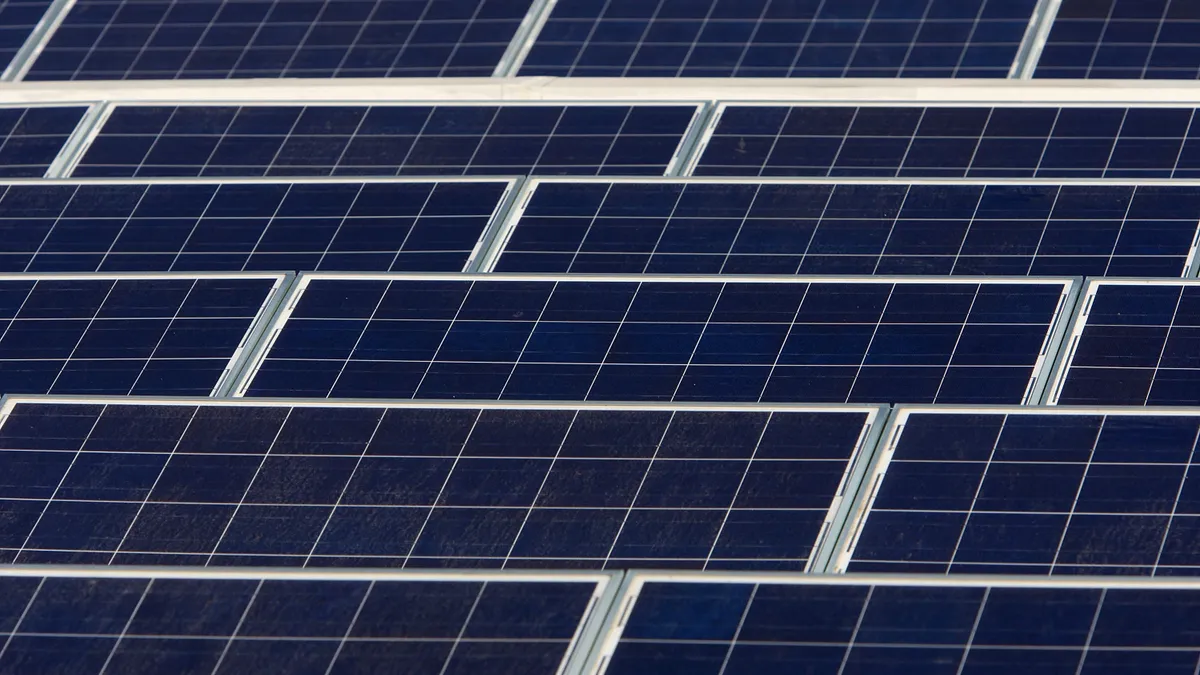Dive Brief:
- U.S.-based PV module manufacturer First Solar will supply up to 5.4 GW of solar panels to bp and solar energy developer Lightsource bp through the year 2025, according to the terms of a deal announced on Monday.
- The deal marks the largest single purchase placed with First Solar since the company’s creation in 1999. According to a First Solar spokesperson, it also marks the third sales record the company has set this year.
- Solar developers may be looking to stock up on essential supplies ahead of a crush of demand inspired by favorable government policy and price volatility in traditional energy sources, according Jeff Dennis, managing director and general counsel for Advanced Energy Economy.
Dive Insight:
Black Friday came a little early for the solar industry this year. First Solar announced Monday that it has signed a deal to provide bp and Lightsource bp, a 50-50 joint venture between Lightsource and bp, with up to 5.4 GW of solar panels between 2023 and 2025.
The arrangement includes firm orders for 4.4 GW, and options for up to 1 GW more. According to the terms of the deal, Lightsource bp will purchase up to 4.3 GW of First Solar’s ultra-low carbon thin film solar modules, and bp will procure up to 1.1 GW. The companies plan to deploy the panels in projects to be built in Arkansas, Kentucky, Ohio, Pennsylvania and Texas, according to Monday’s announcement.
Before Monday’s deal, the company’s largest-ever sale was a 2.4 GW order placed by Intersect Power in February of this year. Before that, a 1.8 GW order by Leeward Renewable Energy in January topped the charts.
Volatile energy markets and supply chain challenges within the solar industry appear to be driving solar developers to lock in ever-larger quantities of PV modules ahead of growing demand, according to First Solar chief commercial officer Georges Antoun.
"The U.S. solar industry is at an important inflection point where it must continue the charge towards delivering 45% of our country’s electricity by 2050 while addressing the risks and uncertainty posed by increasingly volatile solar panel production, pricing, and supply," Antoun said in a statement. "This is where we come in.... We’re delighted that bp and Lightsource bp have placed their trust in us and our technology to help power their growth in the United States."
Dennis said he expected other solar developers could place their own large orders of panels as they strive to offer stable, competitive pricing to potential offtakers as demand for solar energy grows.
"There’s a large, pent up, unmet demand for the electricity that these projects can produce, from large customers in particular," he said. "Given where all the trends are going, I think you will see more developers try to lock in certainty around their supply chains so they can provide a firm low price to their customers."
Particularly for developers looking to sell to large corporate buyers, Dennis said, the speed with which a developer can execute a project is also a key competitive advantage. But in many cases, the biggest barriers to developing a new solar project is not module supplies, but interconnection delays and insufficient transmission.
Favorable policies pushed by the Biden administration, such as tax credit extensions and incentives for projects that incorporate U.S.-made materials, may have played a role in the deal, Dennis said. He noted that First Solar is an American manufacturer, which may suggest bp and Lightsource bp are trying to get ahead of other developers in securing American-built solar modules.
"[Policy] is going to drive a lot of demand for [solar] projects beyond what’s already out there," Dennis said, "giving a lot of project developers the certainty that they can make longer-term commitments and know there will be more customers on the back end."













